Top 10 Gas & Oil Companies in India (2025 Ranking)
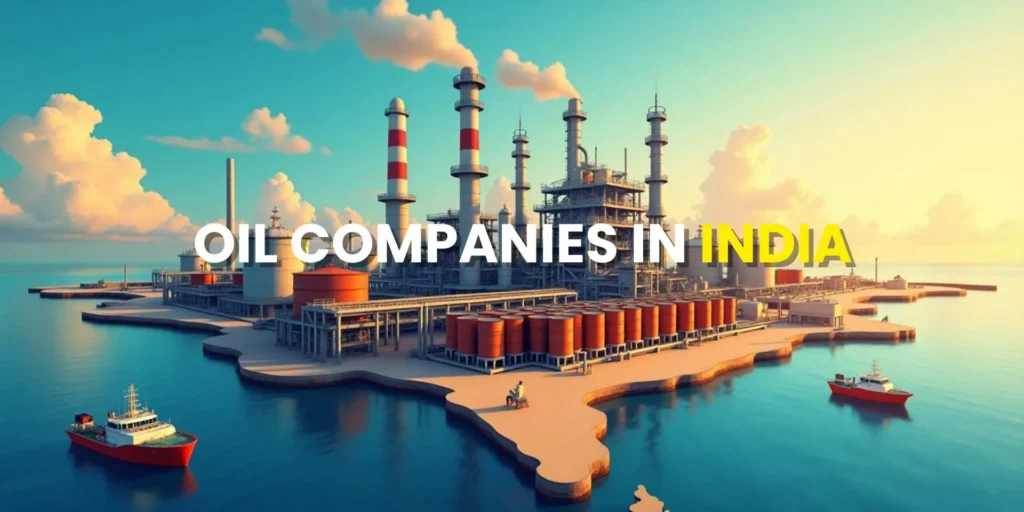
Have you ever been at a petrol pump and seen the numbers on the pump go round and round as your tank gets filled and wondered, where does all this fuel come from? The question is easy, but the answer can lead to a great, wonderful world that makes our lives run, such as the gas stove that cooks dinner and the scooter that travels through the traffic. This is the world of the oil and gas companies of India.
These Oil companies in India are not mere logos on a gasoline station, but the drivers of the economy of our country. They dig oil deep into the earth and ocean, carry it thousands of kilometres across the country, refine it into the petrol, diesel and LPG we use and get it to every corner of the country. To give you an impression of the sheer magnitude that we are talking about, consider this:
- India uses more than 5 million barrels of oil each day, making it the third-largest consumer of oil in the whole world.
- We are importing more than 85 % of our crude oil and thus the international oil market is of paramount importance to our economy.
- The oil and gas industry is a behemoth and it earns India more than 5 % of its Gross Domestic Product (GDP).
- A large portion of the income the government gets, more than 4 lakh crore in the last couple of years, is through taxes levied on petroleum goods.
The next time you spend your money on fuel, then do not forget, you are not purchasing a litre of petrol, rather you are engaging with one of the most important industries in India. It is time to get to know the giants that keep our country moving in a friendly dive into this world.
Role of Oil Companies in India’s Economy
Oil companies do not only serve as filling stations. They play a central role in the Indian economy. Their impact is virtually everywhere in society.
- Powering Up: Oil and gas fuel a lot of industries, manufacturing, transportation, farming, construction, name it. Constant supply of fuel ensures that trucks are on the road, tractors in the fields, and the factories are operating.
- Creating Government Revenue: Government levies a lot of tax on petrol and diesel which is referred to as excise duty. These taxes generate lakhs of crores of rupees which are used in healthcare, education and new roads and bridges. As an illustration, the amount of government revenue in FY2023-24 is likely to be in excess of 4.5 lakh crores through petrol and diesel taxes.
- Job creation: Oil and gas is a huge employer. It provides direct employment to hundreds of thousands of individuals including skilled engineers and geologists as well as to technicians and fuel station attendants. It also causes support businesses to have millions of indirect jobs.
- Infrastructure development: Oil firms spend billions in the development of giant refineries, thousands of kilometres of pipelines and import terminals. Not only does this enhance the energy security but also enhances the overall infrastructure of India.
- Attracting Foreign Investment: The energy market in India is big and promising, attracting big funds and skills from outside the country, which contribute to the development of the sector and its modernization.
Top 10 Oil Companies in India (2025 Ranking)
The oil and gas industry in India consists of both big state-owned enterprises and vibrant privately owned ones. These are the 10 best companies that will influence the energy future of India in 2025.
1. Indian Oil Corporation Limited (IOCL)
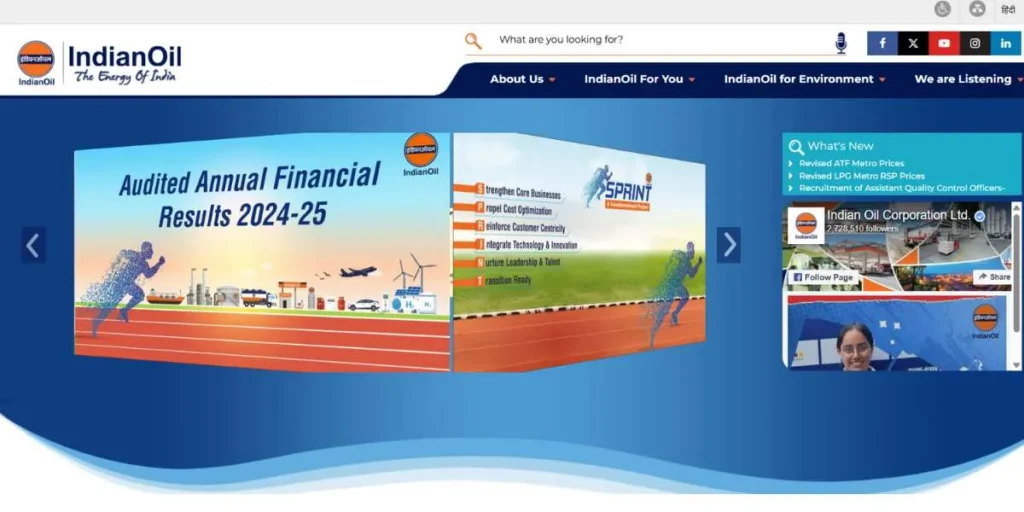
- Founder: Government of India
- Founded In: 1959
- Ratings: AAA (Stable) by CRISIL | 4.1/5 on Glassdoor
- Website: www.iocl.com
- Headquarters: New Delhi, India
- Key Services: Refining, Pipeline Transportation, Marketing of Petroleum Products, Exploration & Production, Petrochemicals.
- 2025 Stats (Estimated): Revenue: ~₹9.5 lakh crore | Refining Capacity: 80.2 MMTPA
IndianOil is the most popular oil company in India and all households are familiar with its name. When you put petrol in your tank at an IndianOil petrol pump, you are encountering this giant. IndianOil is the biggest downstream oil company in the country; it processes crude oil and markets the products. The company has an extensive network of more than 60,000 customer touch points comprising more than 37,000 petrol stations, and Indane LPG distributors that cover millions of Indian kitchens.
Among the leading oil and gas companies in India, IndianOil is also the owner and operator of 10 of the Indian refineries and is thus the leader in the Indian refining industry. The company has robust petrochemical activities, which manufacture materials in plastics, paints, and textiles. It is also transitioning to green energy, establishing EV charging points and making investments in biofuels and hydrogen energy, which is an indication of its willingness to invest in a sustainable future.
2. Bharat Petroleum Corporation Limited (BPCL)

- Founder: Government of India (acquired Burmah Shell)
- Founded In: 1976
- Ratings: AAA (Stable) by CRISIL | 4.2/5 on Glassdoor
- Website: www.bharatpetroleum.in
- Headquarters: Mumbai, Maharashtra
- Key Services: Refining, Marketing and Distribution of Petroleum Products, Petrochemicals.
- 2025 Stats (Estimated): Revenue: ~₹5 lakh crore | Refining Capacity: 35.3 MMTPA
Bharat Petroleum or BPCL is a household name to all the drivers in India. This makes it very serious about quality and customer trust as its slogan is Pure for Sure. BPCL operates three large refineries, in Mumbai, Kochi and Bina, and all of them are among the most efficient in India. Kochi Refinery is a modern plant which produces numerous types of petrochemicals. BPCL operates over 22,000 petrol pumps in India and it is also a major player in LPG under its brand name of Bharatgas. Among the top oil and gas companies in India, it is one of the best oil companies in India.
The company is also diversifying its non-fuel retail business, so that it has everything at its stations, including groceries and cafes. On the renewable-energy side, BPCL is making a big effort in solar, installing solar panels at its locations and establishing EV charging corridors along the major highways in India.
3. Hindustan Petroleum Corporation Limited (HPCL)
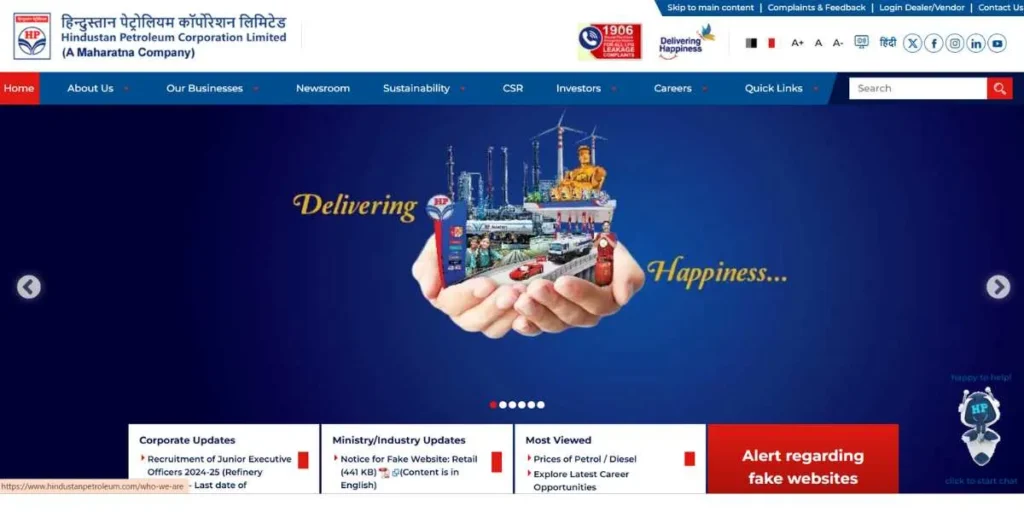
- Founder: Government of India (acquired Esso and Caltex)
- Founded In: 1974
- Ratings: AAA (Stable) by CRISIL | 4.1/5 on Glassdoor
- Website: www.hindustanpetroleum.com
- Headquarters: Mumbai, Maharashtra
- Key Services: Refining, Marketing of Petroleum Products, Lubricants (HP Lubricants), LPG (HP Gas).
- 2025 Stats (Estimated): Revenue: ~₹4.8 lakh crore | Refining Capacity: 27.2 MMTPA
Hindustan Petroleum Corporation Limited (HPCL) is a large Indian government-owned oil company. It was established in the 1970s when two foreign companies, Esso and Caltex, merged and were nationalised. HPCL now operates two large refineries in Mumbai and Visakhapatnam and is planning a third one in Barmer, Rajasthan. It has the largest brand of lubricants in India, which is called HP Lubricants, demonstrating its quality and reach. Its brand HP Gas provides cooking gas to numerous Indian households.
With over 22,000 retail outlets, HPCL is also a company with customer-focused programmes such as Club HP. As one of the prominent oil and gas companies in India, HPCL is expanding its portfolio with investments in renewables, biofuels, and natural gas to align with the long-term energy objectives of India and reduce its carbon footprint.
4. Oil and Natural Gas Corporation (ONGC)
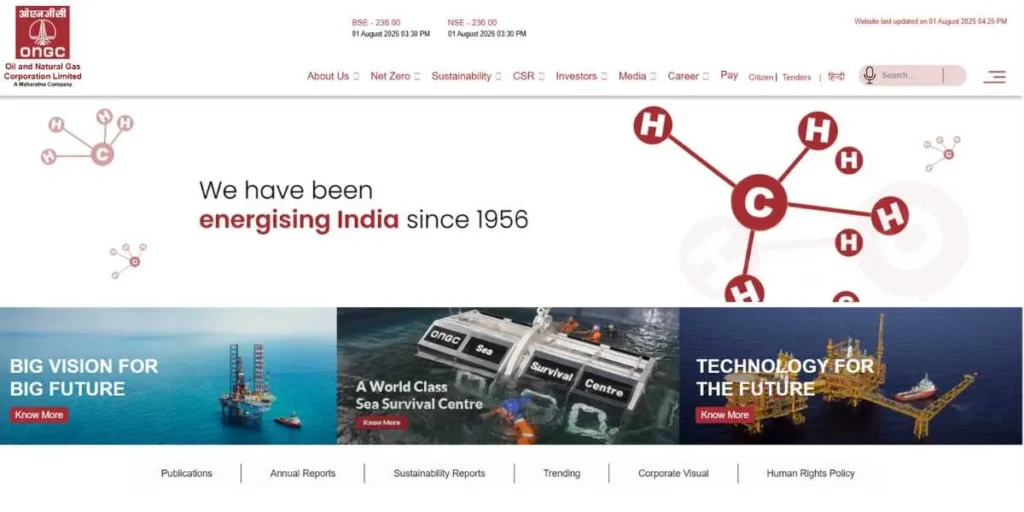
- Founder: Government of India
- Founded In: 1956
- Ratings: AAA (Stable) by CRISIL | 4.1/5 on Glassdoor
- Website: www.ongcindia.com
- Headquarters: New Delhi, India
- Key Services: Exploration and Production (E&P) of Crude Oil and Natural Gas.
- 2025 Stats (Estimated): Revenue: ~₹6.5 lakh crore (consolidated) | Produces ~70% of India’s crude oil.
Petrol, diesel and other fuels are sold by IOCL, BPCL and HPCL. ONGC extracts raw material, that is, crude oil and natural gas, out of the ground. It is the biggest exploration and production (E&P) or upstream giant in India. The operations of ONGC extend to all parts of India including the renowned offshore oil fields of Mumbai High as well as inland oil fields in Assam, Gujarat, and Andhra Pradesh. It is one of the best Oil companies in India. Energy security is high because the company produces much of the domestic oil and gas in India. ONGC has a subsidiary, ONGC Videsh Limited (OVL), that acquires oil and gas properties overseas, sourcing energy to India on a global basis. Since the acquisition of HPCL, ONGC has become a fully integrated player in the whole value chain, i.e., exploration to pump the sale of fuel.
5. Reliance Industries Limited (RIL)
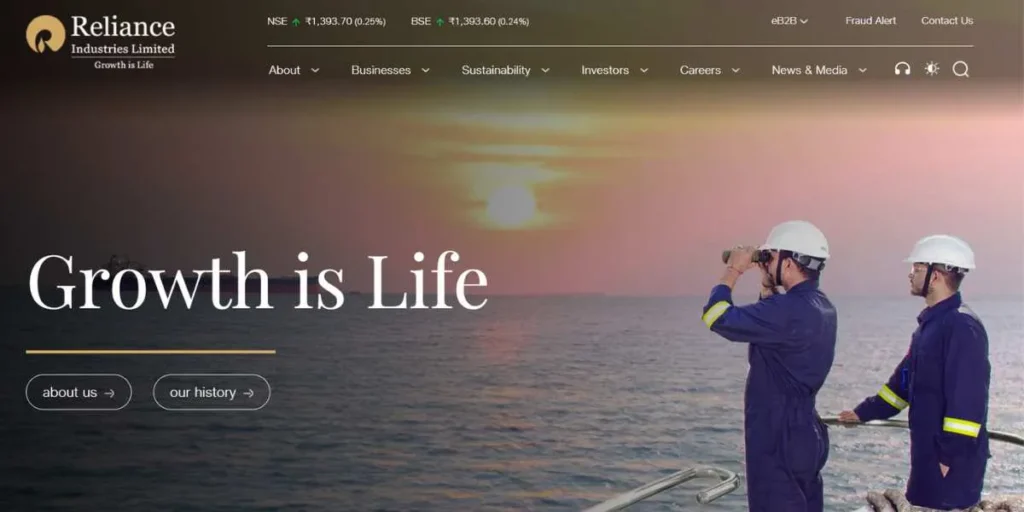
- Founder: Dhirubhai Ambani
- Founded In: 1973
- Ratings: AAA (Stable) by CRISIL | 4.1/5 on Glassdoor
- Website: www.ril.com
- Headquarters: Mumbai, Maharashtra
- Key Services: Refining, Petrochemicals, Exploration & Production, Retail (Jio-bp).
- 2025 Stats (Estimated): Revenue (O2C Business): ~₹6 lakh crore | Refining Capacity: 68.2 MMTPA
Reliance Industries Limited (RIL) is the largest Indian privately owned company and a global energy superpower. It is the story of tremendous ambition and accomplishment. RIL owns and operates the largest and most complex single-location refinery in the world—the Jamnagar refinery complex in Gujarat. This makes it flexible to deal with different types of crude oil and export high-quality petroleum products to the world. It began with textiles, but its oil-to-chemicals (O2C) business is currently the pillar of its empire.
Among the top oil and gas companies in India, RIL has an increasing interest in the fuel retail business with its partner BP, branded as Jio-bp, which is rapidly expanding its network of technologically advanced petrol pumps with EV charging points. In the future, Reliance is transforming itself into a green energy company with plans to invest billions of dollars in solar power, battery storage, and green hydrogen in a bid to become a net-zero carbon company.
6. Oil India Limited (OIL)
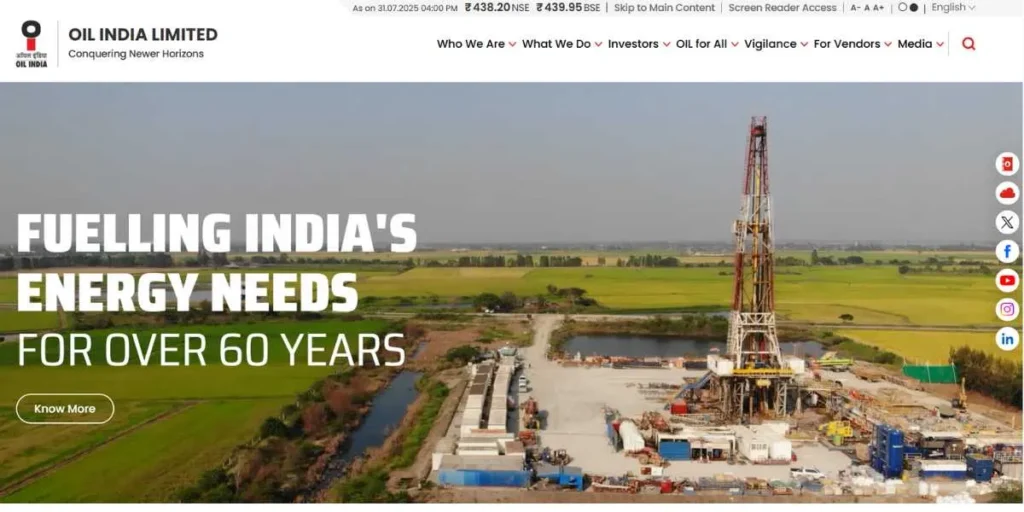
- Founder: Government of India (took over from Burmah Oil Company)
- Founded In: 1959
- Ratings: AAA (Stable) by CRISIL | 4.2/5 on Glassdoor
- Website: www.oil-india.com
- Headquarters: Duliajan, Assam
- Key Services: Exploration, Development, and Production of Crude Oil and Natural Gas; Pipeline Transportation.
- 2025 Stats (Estimated): Revenue: ~₹45,000 crore (consolidated) | Second-largest national E&P company.
Oil India Limited (OIL) is the second largest state owned exploration and production company in India next to ONGC. It began in the oilfields of Assam and this is where the oil story of India began. OIL has been a leader in the industry, and over the last six decades, it has discovered and produced petroleum and natural gas primarily through its Northeast assets. It also has exploration blocks in other regions of India and outside. Its operations are linked by a huge network of crude and product pipelines that constitute an important part of the energy transport system of the country. OIL is also a significant shareholder in Numaligarh Refinery Limited (NRL), which makes its operations more integrated. With the change in energy conditions, OIL is now venturing into renewable energy projects, like solar and wind, to develop a more sustainable business model in the future.
7. GAIL (India) Limited
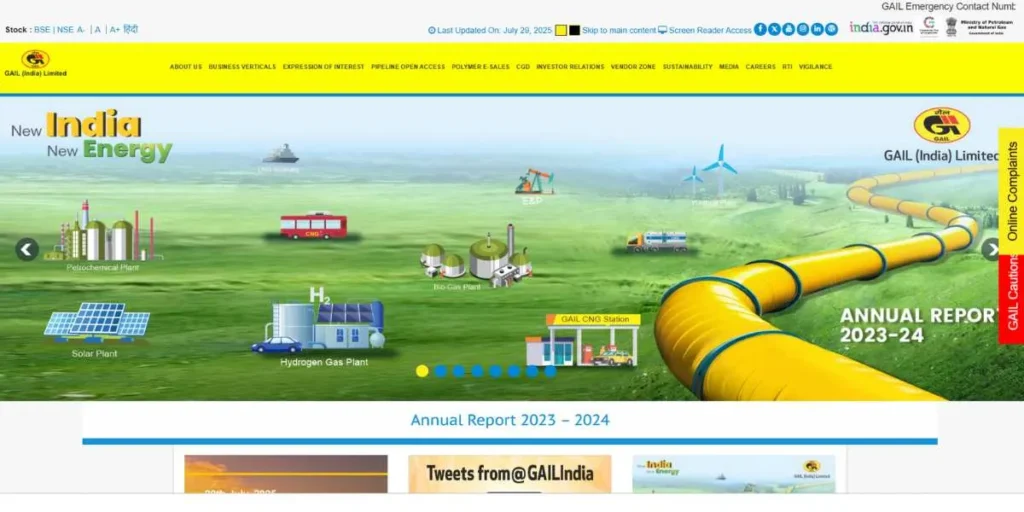
- Founder: Government of India
- Founded In: 1984
- Ratings: AAA (Stable) by CRISIL | 4.2/5 on Glassdoor
- Website: www.gailonline.com
- Headquarters: New Delhi, India
- Key Services: Natural Gas Transmission & Marketing, Petrochemicals, LPG Transmission, City Gas Distribution (CGD).
- 2025 Stats (Estimated): Revenue: ~₹1.5 lakh crore | Operates a gas pipeline network of over 16,000 km.
GAIL is different because most of the companies in this list are about oil. It is the natural gas leader in India. GAIL was established to construct gas pipelines in the nation. Today, GAIL operates and owns the majority of the gas pipes in India, which it terms as the gas highway of India. It transports gas at terminals and production points to power plants, fertiliser factories, industries and city gas companies. It is one of the best Oil companies in India. GAIL is also a processor of gas to produce LPG and has a large presence in petrochemicals. GAIL has a subsidiary company GAIL Gas and stakes in other CGD companies like Indraprastha Gas Limited (IGL) and Mahanagar Gas Limited (MGL) through which it provides cleaner Piped Natural Gas (PNG) to households and Compressed Natural Gas (CNG) to vehicles in various cities of India.
8. Nayara Energy
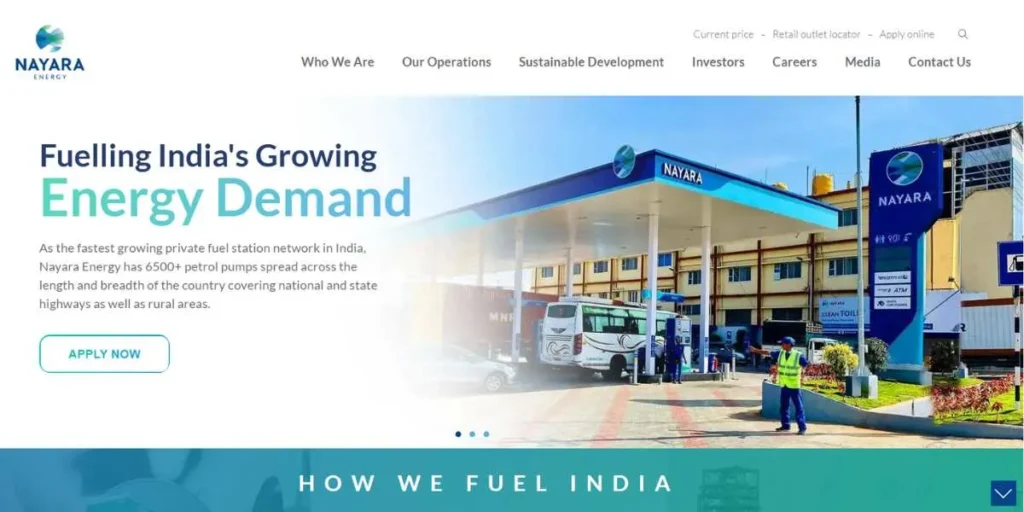
- Founder: Essar Oil (acquired by Rosneft and partners)
- Founded In: 2017 (as Nayara Energy)
- Ratings: AA (Stable) by ICRA | 3.8/5 on Glassdoor
- Website: www.nayaraenergy.com
- Headquarters: Mumbai, Maharashtra
- Key Services: Refining, Marketing, and Retail of Petroleum Products.
- 2025 Stats (Estimated): Revenue: ~₹3.5 lakh crore | Refining Capacity: 20 MMTPA
Nayara Energy (previously Essar Oil) is a large Indian energy market privately held company. It is supported by a group of foreign investors, among which there is the Russian oil giant Rosneft. The primary asset of Nayara is Vadinar refinery in Gujarat, the second-largest single-site Indian refinery. Being a new, sophisticated plant, it is able to handle difficult, heavy crude oils and therefore has competitive advantage. Nayara is also the most rapidly expanding Indian privately owned fuel retailer in India with its network of more than 6,500 petrol stations in India. The company is also interested in developing its retail presence and wants to offer a modern and friendly experience to the customers. Nayara has a world-class asset and a significant retail presence, making it a critical part of the competitive fuel prices and product availability in India.
9. Cairn Oil & Gas (Vedanta)- from here
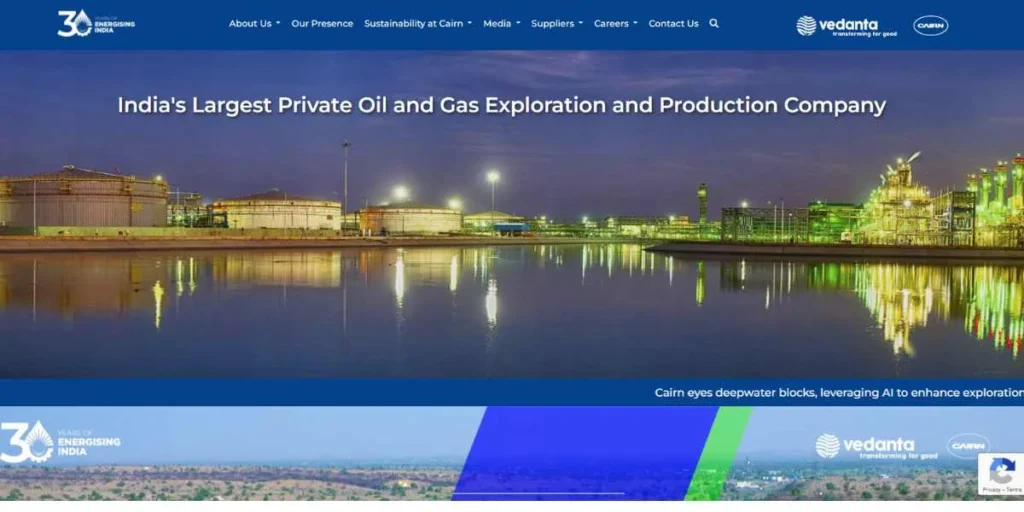
- Founder: Cairn Energy (acquired by Vedanta Group)
- Founded In: 1994 (Cairn in India)
- Ratings: AA (Stable) by CRISIL (for Vedanta) | 3.9/5 on Glassdoor
- Website: www.cairnindia.com
- Headquarters: Gurugram, Haryana
- Key Services: Exploration, Development, and Production of Oil and Gas.
- 2025 Stats (Estimated): Contributes ~25% of India’s domestic crude oil production.
Cairn Oil & Gas is a subsidiary of the diversified metals and mining company Vedanta Limited, India and is the largest private-sector crude oil producer in India. The most notable of its successes was the Mangala oilfield in Rajasthan, the largest onshore oil discovery of the country in over two decades. This discovery redefined the energy map of the region and boosted the domestic production of India. Cairn has a huge production plant at Rajasthan and exports the crude through the longest ever heated pipeline in the world to the coastal refineries. The company employs the latest technologies in the form of Enhanced Oil Recovery (EOR) methods to extract the most out of its fields. The work of Cairn is essential in decreasing the reliance of India on oil imports.
10. Adani Total Gas
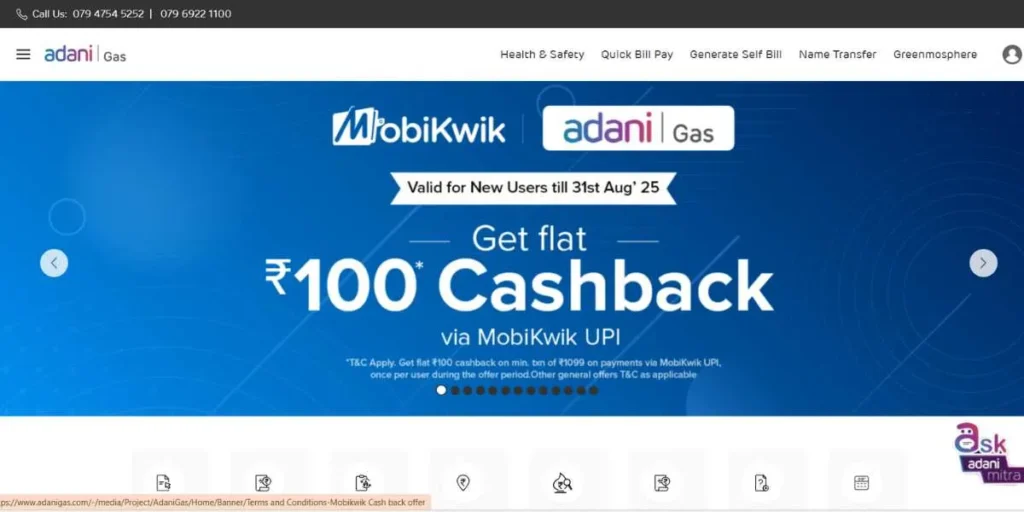
- Founder: Adani Group & TotalEnergies
- Founded In: 2005 (as Adani Gas)
- Ratings: AA+ (Stable) by CRISIL | 4.0/5 on Glassdoor
- Website: www.adanigas.com
- Headquarters: Ahmedabad, Gujarat
- Key Services: City Gas Distribution (CGD) – Piped Natural Gas (PNG) and Compressed Natural Gas (CNG).
- 2025 Stats (Estimated): Expanding its network to cover over 50 geographical areas.
Adani Total Gas is a joint venture between the Adani Group of India and TotalEnergies of France.It is the leader of the Indian gas-based economy. The key activity of the company is City Gas Distribution (CGD) which involves laying pipelines to supply Piped Natural Gas (PNG) directly to the household to cook and industries to use in various activities. It also installs facilities to supply Compressed Natural Gas (CNG) which is cheaper and cleaner than petrol and diesel to vehicles. Adani Total Gas has been awarded licenses in no time to develop CGD networks in many cities and towns in India. It is one of the best Oil companies in India. With the government pushing hard to use natural gas to reduce pollution in the urban centers, companies such as Adani Total Gas will be taking off like a rocket and will be instrumental in making our cities breathe clean air.
Comparison Table: Top Oil & Gas Companies in India
| Company | Revenue (FY24 Approx.) | Ownership | Refining Capacity (MMTPA) | Key Market Focus |
| Indian Oil (IOCL) | ₹8.8 Lakh Crore | Public | 80.2 | Refining, Marketing, Petrochem |
| Reliance Industries (RIL) | ₹5.9 Lakh Crore (O2C) | Private | 68.2 | Refining, Petrochem, Retail |
| Bharat Petroleum (BPCL) | ₹4.4 Lakh Crore | Public | 35.3 | Refining, Marketing |
| Hindustan Petroleum (HPCL) | ₹4.2 Lakh Crore | Public | 27.2 | Refining, Marketing, Lubricants |
| ONGC | ₹6.4 Lakh Crore (Cons.) | Public | – | Exploration & Production (E&P) |
| Nayara Energy | ₹3.2 Lakh Crore | Private | 20.0 | Refining, Retail |
| GAIL (India) Ltd. | ₹1.3 Lakh Crore | Public | – | Gas Transmission, Petrochem |
| Oil India Ltd. (OIL) | ₹41,000 Crore (Cons.) | Public | – | Exploration & Production (E&P) |
| Cairn Oil & Gas | Part of Vedanta Ltd. | Private | – | Exploration & Production (E&P) |
| Adani Total Gas | ₹4,800 Crore | Private | – | City Gas Distribution (CGD) |
Public vs Private Oil Companies in India
In India, the government owns (Public Sector Undertakings or PSUs) companies that work alongside the privately owned companies.
- Public Sector Companies (PSUs): IOCL, BPCL, HPCL and ONGC are examples of PSUs. These are the veterans. They were constructed by the government to develop the energy infrastructure of the country. Their mission usually comprises social goals, such as providing fuel to remote regions, even though it is not profitable at all. They have an enormous, unrivaled coverage in the country.
- The Private Sector Firms: Take the example of Reliance, Nayara and Cairn. These companies are profit and efficiency oriented. They introduce foreign technology, huge investment, and stiff competition. An example of this is Reliance Jamnagar refinery which broke the world record in terms of scale and complexity. The entry of private players tends to drive the limits of innovation and compel the whole industry to become competitive, which in turn is beneficial to the consumer.
The presence of both the government and the private players in the market makes it healthy and balanced. PSUs provide stability and energy security whereas the private companies can be used to provide efficiency and innovation.
Latest Trends in India’s Oil & Gas Sector (2025 Update)
The energy world is changing big time and the Indian oil companies in India are acting fast. These are the two significant changes that will define their future.
The Green Energy Transition:
The world is shifting towards cleaner energy in order to combat climate change and India is a key contributor. Oil companies, which have traditionally been considered to be polluters, are now in the forefront of the largest green initiatives:
- EV Charging Stations: To prepare for the EV boom, companies such as IOCL, BPCL, HPCL, and Jio-bp are erecting electric vehicle (EV) charging stations at their petrol pumps.
- Biofuels: They are putting in a lot of investments in the production of biofuels such as ethanol (which is added to petrol) and compressed biogas (CBG) that are produced using agricultural waste. This assists farmers to get additional revenue and reduces pollution.
- Green Hydrogen: It is the next big thing. Indian companies such as Reliance, IndianOil, and GAIL have said they will become leaders in the production of green hydrogen, a clean fuel that can be used to power industries and heavy transport.
2. Investment in Refining and Exploration
Although India is shifting to green energy, its demand of oil and gas will continue to increase over the next decade. Companies are:
- Increasing the refining capacity. New refineries are under construction such as the one under construction in Barmer, Rajasthan and old refineries are being upgraded in order to produce cleaner and better quality fuel (BS-VI grade).
- Rising domestic exploration. The government is encouraging companies like ONGC, OIL and the private sector to explore new oil and gas fields in India by loosening the policies. This is to identify resources in the challenging deep-water fields and unconventional sources such as shale gas.
Government Role and Regulations in the Oil Sector
India has an energy sector that is overseen by the Ministry of Petroleum and Natural Gas. It is supposed to strike a balance between the interests of businesses and the masses. It influences major policies in three areas:
- Pricing: The official de-regulation of the prices of petrol and diesel is connected to the international prices. Nevertheless, the government is able to regulate them using taxes to cushion extreme high or low fluctuations in prices to consumers.
- Licensing: The ministry grants licenses to companies to explore and produce oil and gas, construct pipelines and establish fuel stations.
- Subsidies: It also provides subsidies on LPG cylinders to deserving households to enable them to afford clean cooking fuel.
- Strategic Reserves: The ministry also manages the strategic petroleum reserves of India which are massive underground caverns that are filled with crude oil to cope with any disruption of supply in the event of a global crisis.
Conclusion: The Road Ahead for Indian Oil Companies
The oil companies in India appear to be still, but they are never still. They not only fill our cars, but they maintain the economy, contribute to national development, and manage one of the largest energy transitions in history.
The state-owned behemoths constructed India as its energy backbone, and the privately owned innovators established world standards. Their new challenge is to reconcile two realities: to meet the current demand of India with oil and gas and to invest in clean energy. It is a tightrope walk and they are doing it with huge investments and planning.
The next time you pay at a fuel station, you should remember how far that litre has travelled. It is an adventure of discovery, engineering and state pride.
What is your vision of the energy future of India? Comment below
FAQs
About Oil Companies in India?
Indian oil companies are companies that engage in exploration, production, and refining of petroleum products and sale.
Which is the largest oil company in India?
Indian Oil Corporation Limited (IOCL) is the largest oil company in India in terms of revenue and refining capacity as well as the operator of the largest fuel station network in the country.
Are there any private oil companies in India?
There are also a number of popular privately owned oil companies. The biggest is Reliance Industries Limited (RIL) that runs the world’s largest refinery. Other major private companies are Nayara Energy, Cairn Oil & Gas (Vedanta) and Adani Total Gas.
What is the role of ONGC and IOCL?
ONGC (Oil and Natural Gas Corporation) is an upstream company. Its primary business is exploration and production of crude oil and natural gas. Indian Oil Corporation Limited (IOCL) is basically a downstream Company; it refines the crude oil (supplied by ONGC and imports) to produce products like petrol and diesel.
 Get 50% off on Vault theme. Limited time offer!
Get 50% off on Vault theme. Limited time offer!